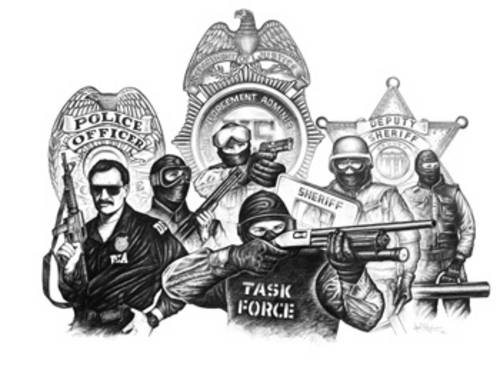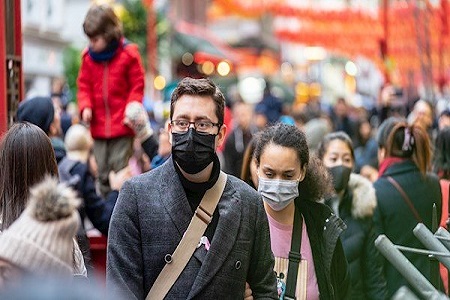INTERPOL Announces the Success of Operation Pangea Agents Nailing Covid-19 Fraudsters
Featured photograph: Contraband confiscated from criminals selling counterfeit medication by INTERPOL.


Counterfeit surgical masks, substandard hand sanitizers and unauthorized antiviral medication are among items seized as part of a global criminal dragnet by the International Criminal Police Association — better known in the United States as Interpol — against criminals cashing in on the Covid-19 pandemic. The famed international crime clearinghouse is already being given credit for the arrest of at least 130 scam and fraud suspects this week, according to a report sent to the National Association of Chiefs of Police’s (NACOP) former vice president, now advisory board member for NACOP..
The outbreak of the Coronavirus disease has offered an opportunity for fast cash, as criminals take advantage of the high market demand for personal protection and hygiene products. The suspects have taken advantage of the fact that police agencies throughout the world are hard-pressed in responding to not only the Coronavirus pandemic, but also radical terrorists’ attacks and bombings, an influx of illegal aliens and fighting routine criminal activity, according to NACOP.
Interpol said the items were all seized under Operation Pangea XIII, which saw police, customs officials and health regulatory bodies from 90 countries targeted the illicit online sale of medicines and medical products.
Law enforcement agencies taking part in Operation Pangea found 2,000 online links advertising items related to COVID-19. Of these, counterfeit surgical masks were the medical device most commonly sold online, accounting for around 600 cases during this past week of police action, according to Interpol’s international law enforcement statements..
The seizure of over 36,000 counterfeit and substandard masks, “corona spray”, “coronavirus packages” or “coronavirus medicine” reveals only the tip of the iceberg regarding this new trend in counterfeiting.
“Once again, Operation Pangea shows that criminals will stop at nothing to make a profit. The illicit trade in such counterfeit medical items during a public health crisis shows their total disregard for people’s wellbeing, or their lives,” said Jürgen Stock, INTERPOL’s Secretary General.
 Interpol said 130 arrests had been made worldwide and potentially dangerous pharmaceuticals worth more than USD $14m were seized in local police raids.
Interpol said 130 arrests had been made worldwide and potentially dangerous pharmaceuticals worth more than USD $14m were seized in local police raids.
According to Interpol, which has its headquarters in Lyon in France: “The outbreak of the Coronavirus disease has offered an opportunity for fast cash, as criminals take advantage of the high market demand for personal protection and hygiene products.”
INTERPOL officials said in their reports that it’s encouraging the public to exercise caution when buying medical supplies online during the current health crisis, with criminals capitalizing on the situation to run a range of financial scams.
“With surgical masks and other medical supplies in high demand yet difficult to find in retail stores as a result of the COVID-19 pandemic, fake shops, websites, social media accounts and email addresses claiming to sell these items have sprung up online,” according to the latest NACOP report released in the U.S..
Sadly, instead of receiving the promised surgical masks and supplies, unsuspecting victims have seen their money disappear into the hands of the criminals involved.
This is one of several types of financial fraud schemes connected to the ongoing global health crisis which have been reported to INTERPOL by authorities in its member countries.
COVID-19 fraud schemes
Scams linked to the virus include:
- Telephone fraud – criminals call victims pretending to be clinic or hospital officials, who claim that a relative of the victim has fallen sick with the virus and request payments for medical treatment;
- Phishing – emails claiming to be from national or global health authorities, with the aim of tricking victims to provide personal credentials or payment details, or to open an attachment containing malware.
In many cases, the fraudsters impersonate legitimate companies, using similar names, websites and email addresses in their attempt to trick unsuspecting members of the public, even reaching out proactively via emails and messages on social media platforms.
“Criminals are exploiting the fear and uncertainty created by COVID-19 to prey on innocent citizens who are only looking to protect their health and that of their loved ones,” said INTERPOL Secretary General Jürgen Stock.
“Anyone who is thinking of buying medical supplies online should take a moment and verify that you are in fact dealing with a legitimate, reputable company, otherwise your money could be lost to unscrupulous criminals,” concluded the INTERPOL Chief.


